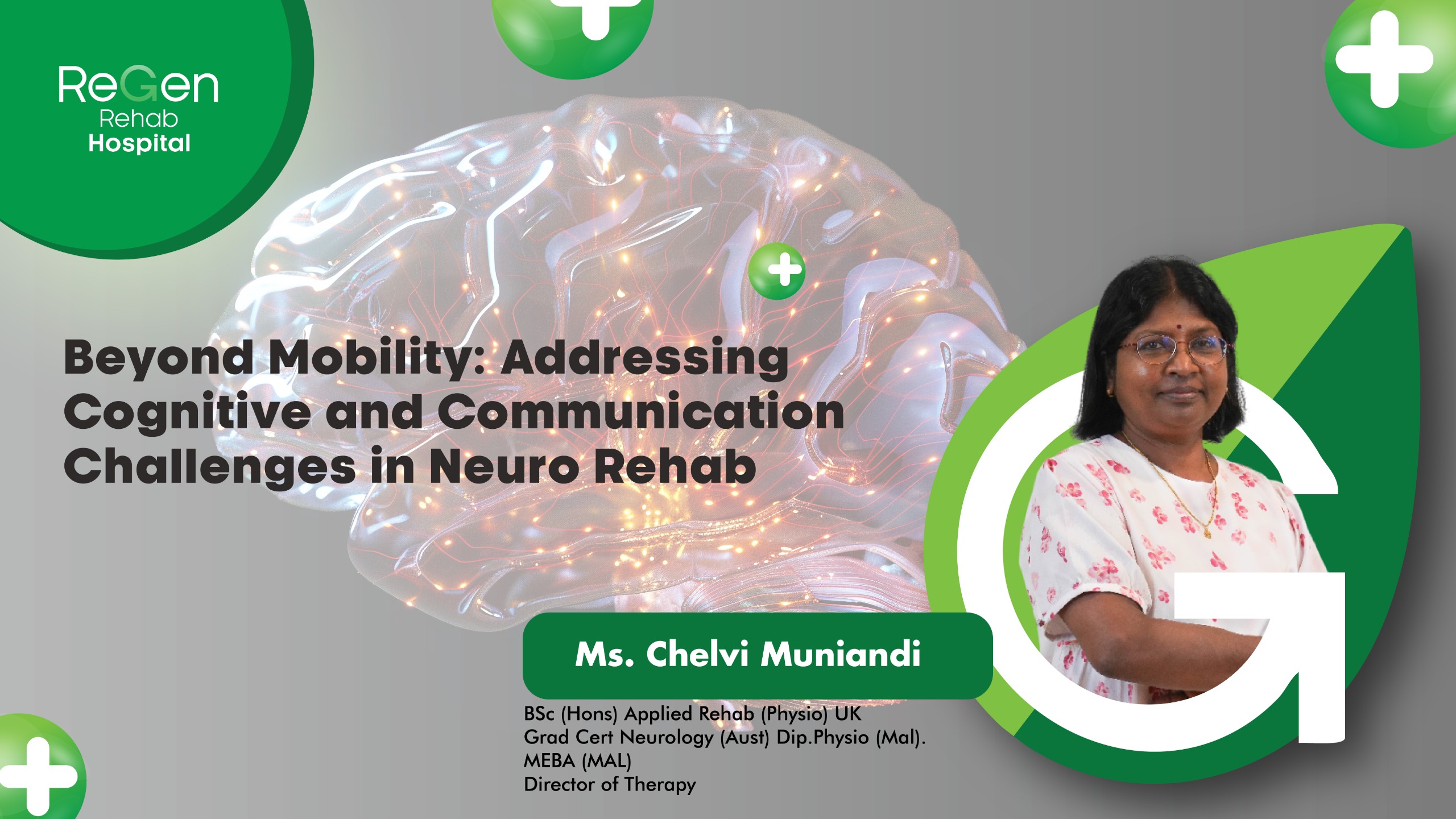Beyond Mobility: Addressing Cognitive and Communication Challenges in Neuro Rehab

When we envision rehabilitation after a neurological event – be it a stroke, traumatic brain injury, or other neurological condition – our minds often jump immediately to physical recovery. We picture individuals relearning to walk, regaining strength in a limb, or improving their balance. And while regaining physical mobility is undoubtedly a critical part of the journey, it tells only half the story.
The truth is, the brain is an intricate network where thought, memory, language, and emotion are inextricably linked to movement. Therefore, truly holistic neuro-rehabilitation must delve beyond mobility to address the equally profound, yet often less visible, cognitive and communication challenges that can emerge.
These unseen impairments can profoundly impact a person’s ability to live independently, maintain relationships, return to work, and engage fully with the world. Without addressing them, even a physically recovered individual might struggle with the complexities of daily life, leading to frustration, isolation, and a diminished quality of life.
The Unseen Impact: Navigating Cognitive Challenges
Neurological damage can disrupt the brain’s delicate machinery responsible for our thought processes. The resulting cognitive challenges are varied and can affect different aspects of mental function:
Memory: Difficulty remembering new information, events, or even familiar faces. This can range from short-term memory deficits to more extensive amnesia. Imagine the struggle of trying to follow a conversation or remember appointments.
Attention: Problems with focus, sustaining attention, or dividing attention between tasks. This impacts everything from reading a book to driving safely or simply listening effectively.
Problem-Solving and Executive Functions: These are higher-level cognitive skills that allow us to plan, organise, initiate tasks, reason, and make decisions. Impairments here can make complex tasks like managing finances, cooking a meal, or planning a day overwhelming.
Processing Speed: A slower ability to process information, leading to delays in understanding conversations, reacting to situations, or performing tasks efficiently.
Spatial Awareness: Difficulties understanding relationships between objects in space, affecting navigation, dressing, or even reading.
These cognitive changes aren’t always immediately obvious, but they can be profoundly debilitating, impacting an individual’s safety, independence, and social interactions.
The Power of Words: Understanding Communication Challenges
Communication is fundamental to human connection and daily life. Neurological damage can significantly impair this ability, leading to immense frustration for both the survivor and their loved ones. Common communication challenges include:
Aphasia: This is a disorder that affects a person’s ability to communicate, ranging from difficulty finding the right words, speaking fluently, understanding spoken language, reading, or writing. It’s not a loss of intelligence, but a disruption in the brain’s language processing centres.
Dysarthria: Caused by weakness or paralysis of the muscles used for speech (lips, tongue, vocal cords), leading to slurred, slow, or difficult-to-understand speech.
Apraxia of Speech: A motor speech disorder where the brain has difficulty coordinating the complex movements required to produce clear speech, even though the muscles themselves are not weak.
Cognitive-Communication Deficits: While not always classified as aphasia or dysarthria, these are communication problems that stem from underlying cognitive issues like attention, memory, or executive function.
For example, difficulty staying on topic, understanding sarcasm, or organising thoughts coherently.
These communication barriers can be incredibly isolating, hindering a person’s ability to express needs, feelings, or engage in meaningful conversations, impacting relationships and overall well-being.
The Holistic View: Why Beyond Mobility is Critical
Focusing solely on physical recovery provides only partial independence. An individual might be able to walk, but if they cannot remember appointments, manage their medication, plan a meal, or communicate effectively, true independence and quality of life remain out of reach.
Comprehensive neurorehabilitation understands that the brain functions as an integrated whole. By addressing cognitive and communication deficits alongside physical ones, rehab aims for maximal functional recovery and meaningful re-engagement with life.
Sarah’s Story: Reclaiming Confidence in the Kitchen
Sarah, a stroke survivor, beautifully illustrates the importance of addressing cognitive and communication challenges. Before her stroke, Sarah loved to cook. But afterwards, she lost her confidence and became afraid to even step into the kitchen.
At ReGen Rehab Hospital, Sarah began her recovery journey in a simulated kitchen environment. Working closely with Occupational Therapists (OTs), they started with simple recipes, carefully assessing her progress and providing support. The OTs checked in with Sarah constantly, asking about pain, muscle stiffness, and any difficulties she encountered. After each session, they discussed specific areas where she struggled and created a plan to target those areas in subsequent sessions.
Through this dedicated and patient approach, Sarah gradually regained her skills and, more importantly, her confidence. The video documentation of her recovery shows her confidently chopping vegetables, seasoning food, and stirring a pot – skills she feared she had lost forever.
By the end, Sarah is seen smiling and enjoying a meal she prepared herself, a testament to the power of holistic rehabilitation that addresses both physical and cognitive needs.
How Neuro Rehab Tackles These Challenges: A Multi-Disciplinary Approach
Effective rehabilitation for cognitive and communication challenges is intensely personalised and relies on a specialised multidisciplinary team:
1. Speech and Language Therapists (SLTs): These specialists are at the forefront of addressing communication and swallowing disorders.
For Aphasia: They use techniques to help individuals retrieve words, form sentences, improve auditory comprehension, and practice alternative communication methods like gestures or communication boards. Therapy often involves intensive practice in real-life scenarios.
For Dysarthria/Apraxia: Exercises focus on strengthening speech muscles, improving breath support, articulation, and voice clarity. They may also work on pacing and intonation.
For Cognitive-Communication: SLTs design tasks to improve attention, memory, and executive function, using language-based activities to enhance these cognitive skills in communication contexts.
Swallowing (Dysphagia): Crucial for safety and nutrition, SLTs provide exercises, compensatory strategies, and dietary modifications to prevent aspiration.
2. Occupational Therapists (OTs): OTs integrate cognitive strategies into daily living tasks.
- They help individuals develop compensatory strategies for memory deficits (e.g., using calendars, alarms, sticky notes).
- They practice problem-solving skills in functional contexts like cooking, managing finances, or organising a workspace.
- They might introduce adaptive techniques or assistive technology to overcome cognitive barriers in daily routines.
3. Neuropsychologists/Cognitive Rehabilitation Specialists: These professionals conduct comprehensive assessments to identify specific cognitive deficits. They then design targeted interventions, which can include:
Cognitive Retraining: Brain exercises to improve attention, memory, and executive functions.
Compensatory Strategies: Teaching practical methods to cope with cognitive weaknesses.
Emotional Support: Addressing depression, anxiety, and frustration often associated with cognitive and communication challenges.
Behavioural Management: Strategies for impulse control or social appropriateness.
4. Medical Oversight: The rehabilitation physician monitors any underlying medical conditions that might impact cognition or communication and manages medications that could affect these functions.
5. Family Education and Support: Critical for success, families are taught how to communicate effectively, create a supportive environment, and reinforce therapeutic strategies at home. Their involvement helps bridge the gap between clinical sessions and real-world application.
The Principles of Effective Cognitive & Communication Rehab
Individualised Approach: No two brains are alike, nor are two neurological injuries. Therapy is meticulously tailored to individual needs and goals.
Repetition and Intensity: Just like physical muscles, brain pathways need consistent, challenging practice to strengthen and reform.
Functional Relevance: Therapy is most effective when it relates directly to real-life situations and tasks.
Technology Integration: Utilisation of apps, speech-generating devices (AAC), and other specialised tools can enhance learning and communication.
Patience and Persistence: Recovery is a marathon, not a sprint. Progress can be gradual, requiring dedication from both the patient and the rehabilitation team.
Choosing the Right Partner in Recovery
When seeking neurological rehabilitation, it is paramount to choose a facility that understands and prioritises this holistic approach. Look for a centre with a dedicated multi-disciplinary team specialising in cognitive and communication therapy, equipped with advanced techniques and a patient-centric philosophy.
By addressing the cognitive and communication challenges with the same rigour as physical ones, comprehensive neurorehabilitation empowers individuals to not only regain movement but also to reconnect with their lives, their loved ones, and their sense of self. It’s about recovering not just physical abilities, but the very essence of who they are.
